Note: Members of the ATM were previously referred to as Early Career Researchers (ECRs)
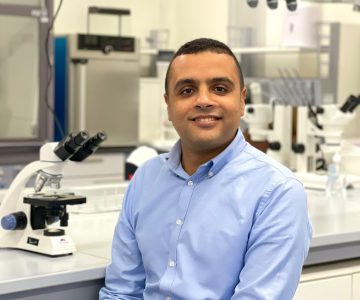
Dr. Khaled Abdelrahman, BPharm, MSc PhD
Assistant Professor, Department of Anesthesiology, Pharmacology & Therapeutics, Faculty of Medicine, UBC | Investigator, Djavad Mowafaghian Centre for Brain Health | Michael Smith Health Research BC Health Professional-Investigator
My lab focuses on exploring the contribution of some G protein-coupled receptors (GPCRs) to the impaired neurovascular coupling and cerebral blood flow autoregulation in Alzheimer’s disease mouse models. We employ in vitro, ex vivo and in vivo approaches to identify novel GPCR candidates that can be targeted pharmacologically to correct neurovascular coupling and slow neurodegeneration. My lab is also interested in studying what aspects of GPCR signaling are regulated in a sex-selective manner and how this can influence drug discovery in the area of neurodegenerative diseases.

Dr. Yossef Av-Gay, BSC, MSc, PhD
Professor, Division of Infectious Diseases, Faculty of Medicine, UBC | Associate Member, Department of Microbiology and Immunology, Faculty of Science, University of British Columbia
https://en.wikipedia.org/wiki/Yossef_Av-Gay
Dr. Yossef Av-Gay is a professor in the Division of Infectious Diseases in the Faculty of Medicine. He is also a member of the department of microbiology and immunology A microbiologist by training, his research interests lie with chronic lung diseases, primarily tuberculosis (TB), followed by nontuberculous mycobacteria (NTM) diseases . He explores molecular events that govern host-pathogen interactions and the ability of mycobacteria to block the immune response to infection. Dr. Av-Gay’s research is geared towards the identification and characterization of novel drugs and drug targets in Mycobacterium tuberculosis. Dr. Av-Gay collaborates extensively with industry leaders, including GlaxoSmithKline and Takeda, and has founded two startup companies. One of them, Beyond Air LTD, is listed in the NASDAQ stock exchange.
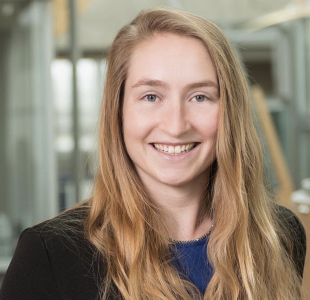
Dr. Anna Blakney, PhD, PEng
Assistant Professor, Michael Smith Laboratories and School of Biomedical Engineering, Faculties of Science, Medicine and Applied Science, UBC
The Blakney Lab is a multidisciplinary group of engineers, immunologists and molecular biologists investigating the interactions between RNA, biomaterials and the immune system to prevent and treat disease.

Dr. Katelynn Boerner, PhD, RPsych
Assistant Professor, Department of Pediatrics, Faculty of Medicine, University of British Columbia | Investigator, BC Children’s Hospital Research Institute | Psychologist, Complex Pain Service, BC Children’s Hospital | Associate Member, Women’s Health Research Institute |
Chronic pain affects many young people. Living with chronic pain can impact a child’s social, emotional, academic, recreational, and developmental outcomes. While there are pain treatments that work, most of them have been developed and tested on populations that do not reflect the diversity of young people we serve in our clinical settings. My research focuses on making pain research and care more accessible and equitable for young people. We do this by understanding the developmental, individual, and social factors that are involved in pain, and by thinking creatively about how to use this information to change practice. I am especially interested in understanding the role of sex, gender, and neurodiversity on pain, and have projects looking at the experiences of chronic pain in gender-diverse and autistic youth.

Dr. Emily Brigham, MD, MHS
Associate Professor, Department of Medicine, Division of Respirology, University of British Columbia | Research Scientist, Vancouver Coastal Health Research Institute | Legacy for Airway Health
My research is focused on: (1) the impact of diet and other metabolic factors on respiratory health in airways disease, (2) how these factors may augment or mitigate the symptomatic and inflammatory response to air pollution and other pro-inflammatory exposures, and (3) ways to translate these findings into actions to improve respiratory health and resiliency, particularly within susceptible populations.
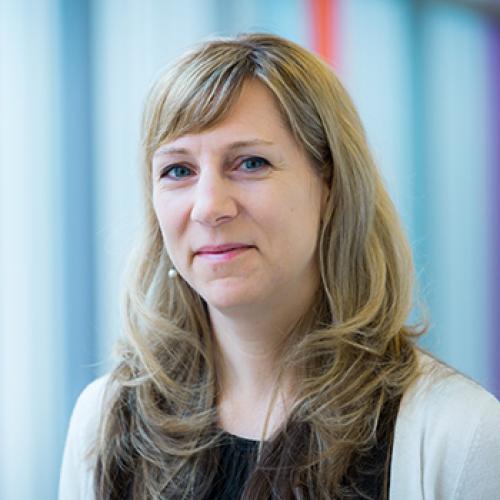
Dr. Kelly Brown
Associate Professor, Division of Rheumatology, Department of Pediatrics, Faculty of Medicine, University of British Columbia | Associate Member, Department of Microbiology & Immunology, Faculty of Science, UBC | Scientist, BC Children’s Hospital Research Institute |
Dr. Brown’s research program uses basic, clinical and translational approaches to study autoimmune vasculitis and autoinflammatory diseases. Her lab wants to provide pediatric-specific evidence about the biology of the diseases as well as the utility of biomarkers for disease severity assessment and prognostication of overall and organ-specific health. The ultimate goal is to improve outcomes for children through the delivery of evidence-based, personalized care. Outside of my research program, Dr. Brown is interested in the development of competency-based graduate education programs for translational scientists.
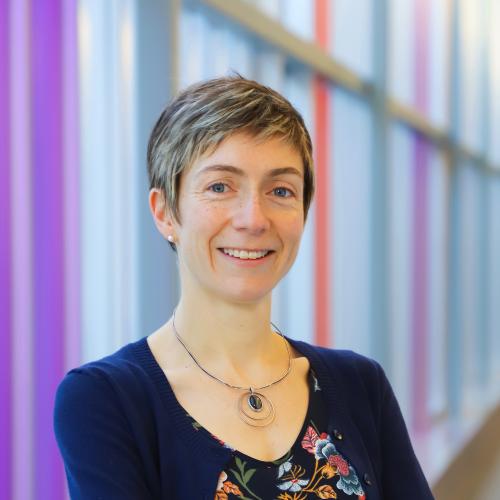
Dr. Jessica Dennis, MSc, PhD
Assistant Professor, Department of Medical Genetics, Faculty of Medicine, UBC | Investigator, BC Children’s Hospital Research Institute | Investigator, Edwin S. H. Leong Centre for Healthy Aging | Investigator, Centre for Molecular Medicine and Therapeutics
The goal of my research program is to advance precision medicine through lifecourse genetic epidemiology, which aims to understand how genetic factors (fixed at conception) interact with time-varying environmental factors to affect phenotypic traits across the life course. In other words, I want to use genetics to match the right person, to the right treatment, at the right time.
My research program is centered on psychiatric and neurodegenerative conditions and leverages the growing repositories of genomic data linked to longitudinal data that are collected as part of routine clinical care and large-scale population-based biobanking efforts.

Dr. Yvette Drew

Dr. Alison Elliott

Dr. Laura Evgin, PhD
Assistant Professor, Department of Medical Genetics, Faculty of Medicine, University of British Columbia | Scientist, BC Cancer |
Dr. Evgin’s lab uses immune-competent mouse models of lymphoma and other cancers to reverse translate CAR T treatment failure and (1) understand T cell intrinsic and complex microenvironmental interactions, (2) use this information to evaluate novel engineered CAR T cells and combinatorial strategies. Dr. Evgin uses novel technologies to generate CAR T cells in vivo and manipulate cell therapies ex vivo.
Read Dr. Evgin’s ECR Spotlight Interview

Dr. Ryan Flannigan, MD, FRCSC
Associate Professor, Department of Urologic Sciences, Faculty of Medicine, UBC | Adjunct Assistant Professor, Department of Urology, Weill Cornell Medicine, New York |
Our research is highly collaborative across numerous domains depending upon the clinical problem that we are looking to solve. We are focused in the fields of male reproduction and sexual medicine. Male Reproduction We are interested in understanding the cellular dysfunction that contribute to males with defective spermatogenesis called ‘Non-obstructive azoospermia’. We are looking to apply these findings to develop a regenerative therapy paradigm through precision medicine-based bioengineering. We are also utilizing machine learning to aid in in vitro sperm identification from clinical samples. Sexual Medicine We are working to understand the molecular underpinnings of Peyronie’s disease cellular dysfunction to identify novel therapeutic targets and to screen and develop. We are working to develop digital technology solutions to improve diagnostic, management and systems-based solutions for sexual medicine care. Finally, we are working to develop a new generation of penile implant designs for males suffering for severe erectile dysfunction.Read Dr. Flannigan’s ECR Spotlight Interview

Dr. Connor Forbes, MD
Assistant Professor, Department of Urologic Sciences, Faculty of Medicine, University of British Columbia | MH Mohseni Institute of Urologic Sciences
Dr Connor Forbes is an Assistant Professor in Urology, practicing at VGH/UBC Hospitals. He completed his medical school and urology residency at UBC, followed by a 2-year combined clinical and research fellowship in Endourology and Minimally Invasive Surgery at Vanderbilt. His research interests are in Benign Prostate Hyperplasia, including basic science mechanisms, and Kidney Stones.

Dr. Ran Goldman, MD, FRCSC
Professor, Department of Pediatrics, Faculty of Medicine, University of British Columbia |
Dr. Goldman is a pediatric emergency physician at BC Children’s Hospital in Vancouver, and professor of pediatrics at UBC, specializing in pediatric pain management, and clinical pharmacology. He is also the co-head of the Division of Translational Therapeutics at UBC. His research focuses on improving children’s health through initiatives like virtual reality for pain distraction and developing reliable online resources for parents.

Dr. David Granville, PhD, FAHA
Professor, Department of Pathology and Laboratory Medicine, Faculty of Medicine, University of British Columbia | Director, British Columbia Firefighters’ Burn and Wound Healing Laboratory, VCHRI, UBC | Founding Core Investigator, Centre for Accelerated Translational Medicine and Regulatory Science, UBC | Principal Investigator, International Collaboration On Repair Discoveries (ICORD) Centre, VCHRI, UBC | Principal Investigator, Centre for Heart Lung Innovation, Providence Research, UBC | Associate Memnder, Department of Surgery, UBC | Founder and Chief Scientific Officer, viDA Therapeutics |
Dr. David Granville is a Professor and Director of the BC Professional Firefighters’ Wound Healing Laboratory and former Executive Director/Associate Dean, UBC Faculty of Medicine. Previously, his preclinical research supported the FDA approval of verteporfin (aka Visudyne®) as the first treatment for macular degeneration, the leading cause of blindness in the elderly. Visudyne® was approved by the FDA, resulting in one of the largest ophthalmic product releases in history. His current research is focused on aging, chronic disease and impaired wound healing. His research on granzymes led to the formation of viDA Therapeutics, for which he is a co-Founder and Chief Scientific Officer.
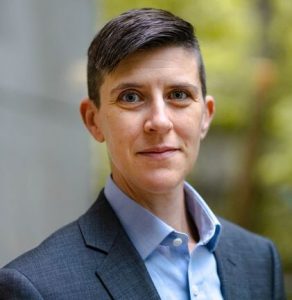
Dr. Devon Greyson

Dr. Ilker Hacihaliloglu, PhD
Associate Professor, Department of Radiology, UBC | Associate Professor, Department of Medicine, UBC | Associate Member, School of Biomedical Engineering, UBC
Research focus areas: Artificial intelligence, machine learning, ultrasound, chronic diseases, traumatic brain injury, brain health, and endometriosis, decentralized healthcare solutions. Translational medicine interests: Generate ideas for community events, workshops, education initiatives and more. Provide a platform for researchers to connect for starting and continuing new collaborations.
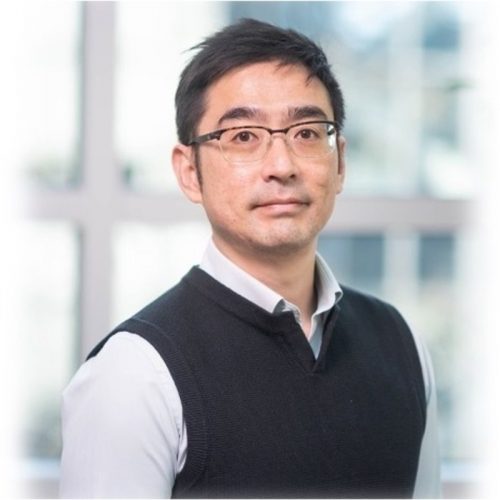
Dr. Myeong Jin Ju, PhD
Assistant Professor, Department of Ophthalmology and Visual Sciences, Faculty of Medicine, UBC | Assistant Professor, School of Biomedical Engineering, Faculty of Medicine and Faculty of Applied Science, UBC |
My research area is in biomedical imaging system development and image analysis, with a specific technology concentration on medical imaging and with knowledge translation and applications to preclinical and clinical vision research. Since I started my research career in biomedical engineering, I’ve been focusing on developing novel optical imaging systems and algorithms for quantitatively imaging biological dynamics in the human retina, more specifically, to develop new label-free optical imaging to contrast macro to sub-micrometre modulations in retinal tissue to single cell in vivo/vitro under a variety of pathophysiological challenges. Another my major research focus is to translate the novel technology to clinics, and ultimately benefit the general public. In particular, I’ve been leading one of the clinical research projects related to Age-related Macular Degeneration (AMD) progress at the Vancouver General Hospital Eye Care Centre and a preclinical project for investigating retinal biomarkers of Alzheimer’s disease at the Jack Bell Research Centre in collaboration with clinicians and vision scientists. Working with clinicians and vision scientists, I have expanded my understanding of retinal neurodegeneration pathology to a broader context beyond the anatomical structure, including the biochemical, cellular and tissue level factors that form a dynamic system of complex interdependency. Through collaborative research experience, I’ve been able to become a well-balanced independent researcher who explores and solves various clinical questions and clinical needs.

Dr. Steven Jones, PhD, FRSC, FCAHS, FRCP(Edin)
Professor, Department of Medical Genetics, Faculty of Medicine, The University of British Columbia | Co-Director and Head, Bioinformatics, Canada’s Michael Smith Genome Sciences Centre | Canada Research Chair in Computational Genomics
Dr. Jones is Co-Director and Head of Bioinformatics at the Michael Smith Genome Sciences Centre, BC Cancer, and Canada Research Chair in Computational Genomics at UBC. A Fellow of the Royal Society of Canada and the Canadian Academy of Health Sciences, he is recognized as one of the world’s most influential researchers by Thompson Reuters and Clarivate Analytics, with over 500 peer-reviewed publications and numerous honors. He has given over 150 presentations globally and is a leading expert in genomic sequencing and analysis.
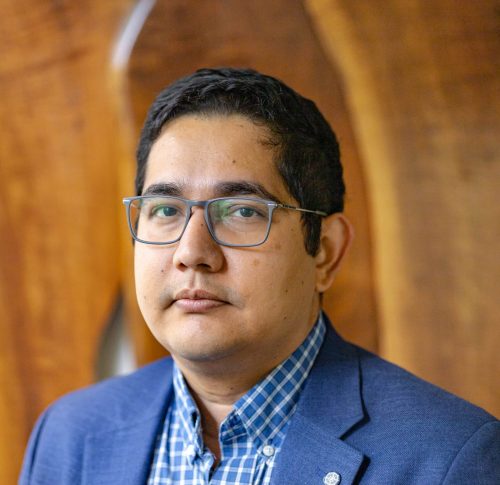
Dr. Ehsan Karim, PhD
Associate Professor, School of Population and Public Health, Faculty of Medicine, UBC | Scientist, Centre for Advancing Health Outcomes |
Dr Ehsan Karim is an Associate Professor in Health Data Science at the UBC School of Population and Public Health, a Scientist at the Centre for Advancing Health Outcomes, and a specialist in causal inference, machine learning, biostatistics, and pharmacoepidemiology. His research focuses on developing methodologies for analyzing observational data in large healthcare datasets, with applications in comparative effectiveness research.

Dr. Jayachandran Kizhakkedathu, PhD
Professor and Canada Research Chair, Department of Pathology and Laboratory Medicine, Faculty of Medicine, University of British Columbia | Associate Member, The School of Biomedical Engineering, UBC | Principal Investigator, Centre for Blood Research, UBC |
Dr. Kizhakkedathu is a Professor and Tier 1 Canada Research Chair in Immunomodulating Materials and Immunotherapy. Dr. Kizhakkedathu is leading a cutting-edge translational research program to innovate materials and therapeutics that can treat and prevent thrombosis, bleeding, immunothrombosis and infection, immunological rejection of organs and cells, and protection of tissues and organs in inflammatory conditions.
Dr. Kizhakkedathu’s research has been published in both fundamental science and clinical journals including the top journals in biomaterials, biotechnology, materials, translation medicine and hematology: Science Translational Medicine, Nature Materials, Nature Biotechnology, Nature Biomedical Engineering, Nature Communications, Blood, Journal of the American Chemical Society, Biomaterials, ACS Nano, ACS Central Science among many others, and several patents which form the foundation of a few companies.

Dr. Ramon Klein Geltink

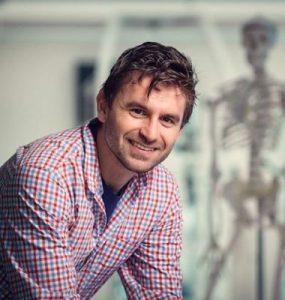
Dr. John Kramer

Dr. Calvin Kuo

Dr. Zachary Laksman, MD, MSc, FRCPC
Associate Professor, Department of Medicine and School of Biomedical Engineering, Faculty of Medicine, University of British Columbia | Cardiac Electrophysiologist, St. Paul’s and Vancouver General Hospital | Director, St. Paul’s Hospital Electrophysiology Lab and Procedure Rooms | Director, British Columbia Inherited Arrhythmia Clinic | Director of Innovation, UBC Division of Cardiology|
Dr. Zachary Laksman is a cardiac electrophysiologist and clinician-scientist at UBC and St. Paul’s Hospital Director of the Electrophysiology Lab and Procedure Rooms, the Inherited Arrhythmia Clinics, and the Director of Innovation for UBC’s Division of Cardiology. His translational program integrates cardiogenetics, iPSC-based disease modeling, 3D printing, and AI to advance precision medicine. A recipient of Canada’s Top 40 Under 40, he is an Associate Tenured Professor in the Department of Medicine and the School of Biomedical Engineering and a member of the Centre for Heart Lung Innovation.

Dr. Joseph Lau, PhD
Assistant Professor, Department of Radiology, Faculty of Medicine, University of British Columbia | Scientist, Department of Basic and Translational Research, BC Cancer Research Institute |
Dr. Joseph Lau is an Assistant Professor in the Department of Radiology at the University of British Columbia (UBC), and a Scientist in the Department of Basic and Translational Research at the BC Cancer Research Institute (BCCRI). Dr. Lau received his PhD in Interdisciplinary Oncology at UBC, and completed postdoctoral training at the National Institutes of Health. Before joining UBC, Dr. Lau was Associate Director of Discovery at Alpha-9 Theranostics, a radiopharmaceutical company based in Vancouver, BC. His research group focuses on the development of novel radiopharmaceuticals to improve cancer diagnostics and therapy.

Dr. Pascal Lavoie, MDCM, PhD, FRCPC
Professor, Department of Pediatrics, Faculty of Medicine, University of British Columbia | Clinician-Scientist, BC Children’s Hospital and Women’s Health Research Institute | Institute for Global Health, UBC | Affiliated Investigator, Experimental Medicine and Women and Children’s Health Sciences Graduate Programs, UBC |
Our research bridges neonatal intensive care, immunology, and global health, with a focus on RSV prevention, epidemiology, immune development in neonates and infants, neonatal sepsis diagnostics, and host-pathogen immune interactions. I work to advance innovative diagnostics and therapeutics and to translate evidence into policy and practice for vulnerable infants worldwide.

Dr. Anna Lehman, MD, FRCPC, MA
Associate Professor, Department of Medical Genetics, Faculty of Medicine, University of British Columbia
Dr. Anna Lehman is Medical Director of the Adult Metabolic Diseases Clinic at Vancouver General Hospital and Associate Professor of Medical Genetics at the University of British Columbia. She is an Investigator in BC Children’s and Women’s Hospital and Vancouver Coastal Health Research Institutes. Her research program identifies genetic causes for rare diseases, improves the diagnostic process for people with genetic disorders, and evaluates treatment strategies for inherited metabolic diseases. These findings have been disseminated in more than 150 peer reviewed publications. She serves on the Board of Directors for the Canadian College of Medical Genetics.

Dr. Megan Levings, PhD
Professor, Department of Surgery and School of Biomedical Engineering, Faculty of Medicine, University of British Columbia | Investigator, BC Children’s Hospital Research Institute | Project Lead, Advanced Therapeutics Manufacturing Facility |
Dr. Megan Levings pursued graduate training with Dr. John Schrader at the University of British Columbia (UBC), studying cytokine receptors and signalling pathways. In 1998 she joined Dr. Maria Grazia Roncarolo’s lab in Milan for postdoctoral training in immune regulation. During this time, she conducted pioneering work to define what we now know as regulatory T cells (Tregs). Dr. Levings was recruited back to UBC in 2003, joining the Department of Surgery as a Canada Research Chair in Transplantation. Her lab continues to advance translational Treg research, most recently pioneering cell engineering strategies to direct specificity and enhance function

Dr. David Liu, MD FRCPC FSIR FFX
Associate Professor, School of Biomedical Engineering | Interventional Radiologist, Vancouver Coastal Health | Radiologist, BC Cancer Agency | Head, Minimally Invasive Image Guided Procedures Lab (MIIPs)|
David Liu MD FRCPC FSIR FFX is a globally recognized interventional radiologist celebrated for his innovative leadership in oncological imaging and therapeutic development. With Professorial appointments in both the Faculty of Medicine and Biomedical Engineering at University of British Columbia in Vancouver Canada, he is considered a pioneer in the clinical use and optimization of radioembolization for liver cancer, he has shaped international standards and care pathways through cutting-edge research and translational practice. In addition, Dr. Liu holds chairperson positions in international liver cancer symposiums, and has received multiple major awards from leading societies in radiology and oncology. His influence spans over 90 peer-reviewed publications, extensive international invited lectureships, and high-impact leadership in both academia and industry.

Dr. Jonathan Loree, MD, MSc, FRCPC
Assistant Professor, The University of British Columbia | Medical Oncologist, BC Cancer | Senior Investigator, Canadian Cancer Trials Group | Colon Cancer Task Force Co-Chair, NIH National Cancer Institute
Read Dr. Loree’s ECR Spotlight Interview
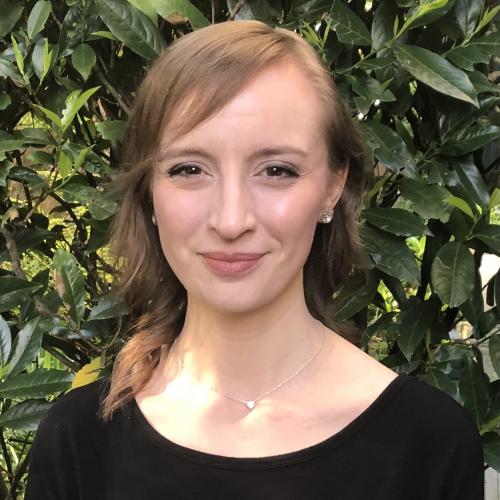

Dr. Genelle Lunken, RD, PhD
Assistant Professor, Department of Pediatrics, Faculty of Medicine, University of British Columbia | Associate Member, Department of Medicine, UBC | Translational Research Lead and Specialist IBD Dietitian, IBD Centre of BCl |

Dr. Christopher Maxwell, PhD
Department of Pediatrics, Faculty of Medicine, University of British Columbia | Investigator, Michael Cuccione Childhood Cancer Research Program | Lead, Childhood Cancer and Blood Research group, BC Children’s Hospital |
Dr. Christopher Maxwell is a professor in the Department of Pediatrics at the University of British Columbia and a Researcher at BC Children’s Hospital, where I lead the Childhood Cancer and Blood Research group. Dr. Maxwell received his Ph.D. in Medical Sciences from the University of Alberta and completed post-doctoral studies at Lawrence Berkeley National Laboratory and the Catalan Institute of Oncology before joining the faculty at UBC. His research program aims to understand cell division at the molecular level and apply that knowledge to the study of hereditary and childhood cancers with a specific interest in the roles of BRCA1 during mammary gland development.

Dr. Kelly McNagny, PhD
Senior Scholar, Michael Smith Foundation for Health Research | Member, Stem Cell Network of Canada | Vice President, Canadian Society for Immunology |
Dr McNagny obtained his PhD in Immunology at the U of Alabama, Birmingham (1990) with Max Cooper (National Academy of Sciences) studying B cell development. He performed postdoctoral training with Thomas Graf (EMBL, Heidelberg) studying transcriptional control of stem cell fate. In 1998 he started his own laboratory at the University of British Columbia focused on the CD34 family, stem cell behavior, innate immune responses, inflammatory disease, cancer biology and therapeutics. He is a Professor of Medical Genetics and Biomedical Engineering. Nationally, he filled leadership roles in the Stem Cell and AllerGen NCEs. He is Vice President of the Canadian Society for Immunology.

Dr. Souvik Mitra, MD, MSc, PhD, FRCPC
Associate Professor, Department of Pediatrics, Faculty of Medicine, The University of British Columbia | Research Director, Division of Neonatology | Neonatal Hemodynamics and Targeted Neonatal Echocardiography Program Co-Director, Division of Neonatology | Michael Smith Health Research BC Health-Professional Investigator, BC Children’s Hospital Research Institute | Chair, Fetus and Newborn Committee, Canadian Pediatric Society |
Critical care decisions in the smallest and sickest newborns are often based on research that has rarely included such critically ill babies and has seldom explored outcomes that actually matter to families. As a PhD trained neonatologist caring for the tiniest and most vulnerable humans, my research program called the BOOST (The Better Outcomes for the Sickest & Tiniest), aims to address these knowledge gaps through robust clinical trials and by incorporating the principles of practice of ‘evidence-based medicine’ in their care.

Dr. Srinivas Murthy, MD CM, MHSc
Clinical Associate Professor, Department of Pediatrics, Faculty of Medicine, The University of British Columbia
Srinivas Murthy is a pediatric intensive care physician and clinical researcher whose research interests focus on the management of severely infected people, global health, and climate change.

Dr. Brad Nelson, PhD
Professor, Department of Medical Genetics, Faculty of Medicine, University of British Columbia | Scientific Director, Immunotherapy Program, BC Cancer | Professor, Biochemistry/Microbiology, University of Victoria |
Dr. Nelson received his BSc from UBC and PhD from the University of California at Berkeley. He did his postdoctoral training and held faculty positions at the Fred Hutchinson Cancer Research Center and University of Washington in Seattle. In 2003, he became the founding Director of BC Cancer’s Deeley Research Centre in Victoria BC. Dr. Nelson’s lab uses genomic and molecular approaches to study the immune response to cancer, with a focus on B cell responses. He is co-leading a phase I/II clinical trials program focused on engineered T cell therapies for lymphoid and gynecological cancers.
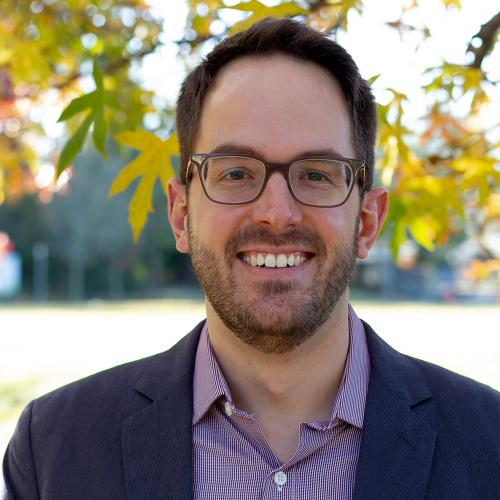
Dr. Seth J Parker

Dr. Mahmoud Pouladi, MSc, PhD
Associate Professor, Department of Medical Genetics, Faculty of Medicine, The University of British Columbia | Investigator, BC Children’s Hospital Research Institute | Investigator, Djavad Mowafaghian Centre for Brain Health | Scientist, Centre for Molecular Medicine and Therapeutics | Investigator, Edwin S.H. Leong Centre for Healthy Aging
Dr. Mahmoud Pouladi is an Associate Professor in the Department of Medical Genetics at the University of British Columbia and an Investigator at BC Children’s Hospital Research Institute. The Pouladi Lab integrates human pluripotent stem cell models, genome editing, and multi-omics approaches to study pathways linking genetic variation to disease. Dr. Pouladi’s research program focuses on the molecular and cellular mechanisms underlying neurodevelopmental and neurodegenerative disorders, with emphasis on fragile X syndrome and Huntington’s disease.
Dr. Pouladi received his PhD in Canada and led a research group in Singapore before returning to Vancouver. His work has contributed to the development of novel models and therapeutic strategies for Huntington’s disease and related disorders. He is internationally recognized for building cross-disciplinary collaborations and leads initiatives that bridge fundamental biology with translational research to improve diagnosis and treatment for childhood and adult-onset brain disorders.

Dr. Jonathan Rayment, MDCM, MSc, FRCPC
Clinical Associate Professor, Department of Pediatrics, Faculty of Medicine, University of British Columbia | Associate Member, School of Biomedical Engineering, University of British Columbia
Dr Rayment is a pediatric respirologist and Clinical Associate Professor in the Department of Pediatrics at BC Children’s Hospital and the University of British Columbia in Vancouver, BC. He runs a clinical research program that focuses on the technical development and clinical implementation of advanced pulmonary diagnostics in children, with a focus on novel imaging and physiologic diagnostic tools. His clinical focus is on the treatment of children with cystic fibrosis, interstitial lung disease and those with pulmonary complications of childhood cancer. He uses his clinical practice as a springboard to develop clinically meaningful research to help children with lung disease.

Dr. Thiviya Selvanathan, MD, PhD, FRCPC
Assistant Professor, Department of Pediatrics, Faculty of Medicine, University of British Columbia | Investigator, BC Children’s Hospital Research Institute | Pediatric Neurologist, BC Children’s Hospital | Affiliate Member, Women’s Hospital Research Institute
My research uses advanced brain MRI and brain monitoring techniques to identify how early-life brain injury, clinical care in the NICU, and social determinants of health impact neurodevelopment in newborns at high risk for developmental disabilities. Understanding what factors impact brain development may point to new strategies for promoting long-term brain health in high-risk infants. I am also interested in identifying potential brain MRI-based markers of brain health and neurodevelopment that could be used in clinical trials of neuroprotective therapies in preterm and term-born infants with brain injury.

Dr. Manish Sadarangani, BM, BCh, FRCPC, DPhil
Associate Professor, Department of Pediatrics, Faculty of Medicine, University of British Columbia | Director, Vaccine Evaluation Center, BC Children’s Hospital Research Institute | Physician Lead, Family Immunization Clinic, BC Children’s Hospital | Sauder Family Chair in Pediatric Infectious Diseases
Dr Manish Sadarangani is Director of the Vaccine Evaluation Center at the BC Children’s Hospital Research Institute and an Associate Professor in the Division of Infectious Diseases, UBC Department of Pediatrics. He is an international expert in translational vaccinology, whose work uniquely encompasses laboratory, clinical and epidemiologic research. His scientific expertise enables him to respond quickly to changing priorities to tackle diverse knowledge gaps rapidly and produce high quality research findings to inform policy. Specifically, his research improves understanding of immune responses to vaccination, identifies high-risk groups to target immunization programs, and evaluates vaccine effectiveness to inform evidence-based policy.

Dr. Manish Sadarangani, BM, BCh, FRCPC, DPhil
Associate Professor, Department of Pediatrics, Faculty of Medicine, University of British Columbia | Director, Vaccine Evaluation Center, BC Children’s Hospital Research Institute | Physician Lead, Family Immunization Clinic, BC Children’s Hospital | Sauder Family Chair in Pediatric Infectious Diseases
Dr Manish Sadarangani is Director of the Vaccine Evaluation Center at the BC Children’s Hospital Research Institute and an Associate Professor in the Division of Infectious Diseases, UBC Department of Pediatrics. He is an international expert in translational vaccinology, whose work uniquely encompasses laboratory, clinical and epidemiologic research. His scientific expertise enables him to respond quickly to changing priorities to tackle diverse knowledge gaps rapidly and produce high quality research findings to inform policy. Specifically, his research improves understanding of immune responses to vaccination, identifies high-risk groups to target immunization programs, and evaluates vaccine effectiveness to inform evidence-based policy.

Dr. Kirk Schultz, MD, FCAHS
Professor, Department of Pediatrics, Faculty of Medicine, UBC | BC Children’s Hospital Research Institute | Director, radCAR Pediatric Cancer Immune Therapy Program |
Dr. Kirk Schultz is a Pediatric Hematologist/Oncologist focused on new therapies and chronic GvHD in Blood and Marrow Transplantation (BMT) and immune therapy of pediatric cancers with 260 peer-reviewed papers. Dr. Schultz was a recipient of the CIHR/Wyeth Clinical Research Chair in Transplantation and past chair of the Pediatric BMT Consortium. Dr. Schultz is a fellow of the Canadian Academy of Health Sciences. He is Editor-In-Chief of Pediatric Hematology and Oncology (PHO). He is the founder of the Applied Biomarker in Late Effects (ABLE) cGvHD biomarker network and the Westhafen Intercontinental Group, the international pediatric BMT leadership group.
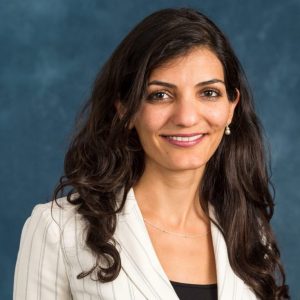
Dr. Dena Shahriari, PhD
Assistant Professor, Department of Orthopaedics, School of Biomedical Engineering, UBC | International Collaborations on Repair Discoveries (ICORD) | Institute for Computing, Information and Cognitive Systems (ICICS)
https://bioauglab.med.ubc.ca/?login
Read Dr. Shahriari’s ECR Spotlight Interview
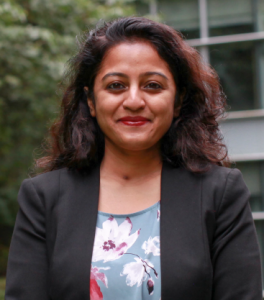
Dr. Veena Sriram

Dr. Adi Steif, PhD
Assistant Professor, Department of Medical Genetics, Faculty of Medicine, UBC | Scientist, Genome Sciences Centre, BC Cancer Research Institute |
The Steif Lab develops and applies computational methods for analysis of large-scale omics datasets. We collaborate with biomedical engineers, molecular biologists and clinicians to advance genomic technology and characterize tumour composition in order to elucidate the mechanisms underlying treatment resistance and cancer progression.

Dr. Stuart Turvey, MBBS, DPhil, FRCPC
Professor, Department of Pediatrics, Faculty of Medicine, UBC | Investigator, BC Children’s Hospital Research Institute | Co-Director, CHILD Study |
Stuart Turvey is a Pediatric Clinical Immunologist, UBC Professor of Pediatrics, and holder of the Tier1 Canada Research Chair in Pediatric Precision Health. As a practising pediatric immunologist based at BC Children’s Hospital, Dr. Turvey’s research program responds to major challenges in contemporary pediatric medicine. Specifically, his research focuses on childhood immune deficiency diseases and disorders of immune dysfunction including asthma, allergies, and autoimmunity. Dr. Turvey is internationally recognized for his research in developing precision health-based strategies to address childhood asthma and pediatric immune system disorders, and he is a highly effective mentor for the next generation of child health clinician-scientists.
Dr. Tamara Vanderwal
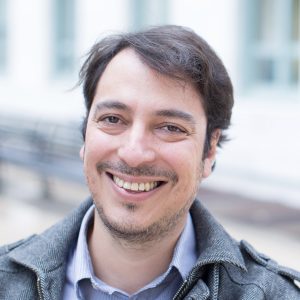
Dr. Daniel Vigo